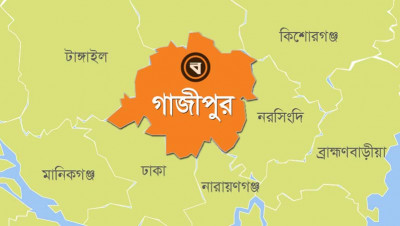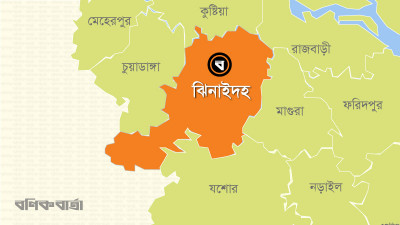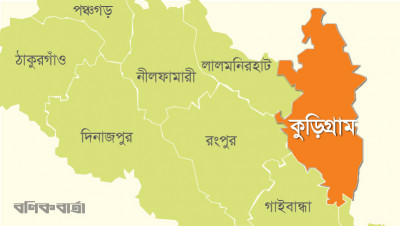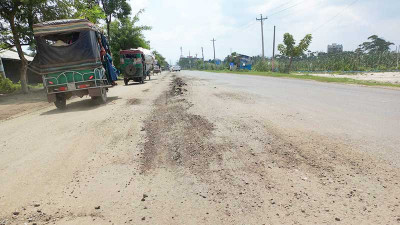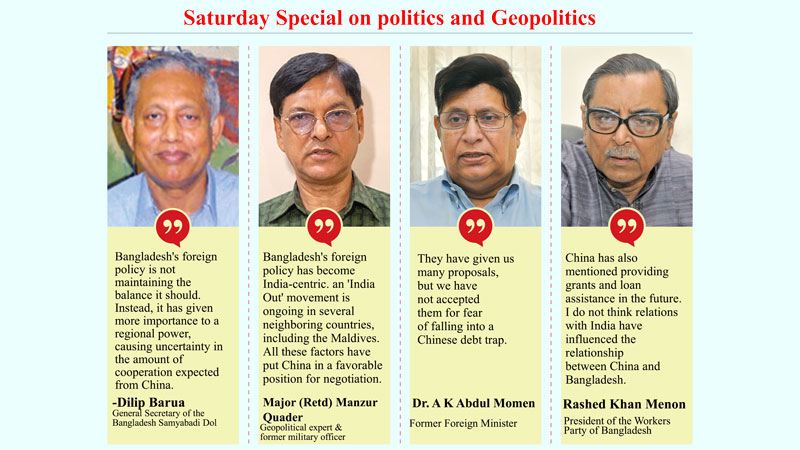 Photo: Bonik Barta
Photo: Bonik Barta It
was October 14, 2016. A special aircraft landed on the runway of Hazrat
Shahjalal International Airport, carrying Xi Jinping and his entourage from
Beijing. The plane carrying the Chinese
President was escorted by fighter jets of the Bangladesh Air Force. Accompanied
by several cabinet members, then-President Abdul Hamid welcomed the Chinese head
of the state. A 21-gun salute was given in honor of President Xi Jinping.
This
was the first visit by any Chinese president to Dhaka in three decades, marking
a new height in China-Bangladesh bilateral relations. During that visit, Xi
Jinping announced investments and financial aid amounting to nearly 25 bln dollars.
Bangladesh was beginning to be considered an important partner in China's
ambitious Belt and Road Initiative (BRI). Despite intense hostility with
neighboring India, China maintained a consistent stance on Bangladesh. Dhaka
maintained a balanced foreign policy with Beijing and Delhi. Beijing became a
major political supporter of the Awami League (AL) government. This was even
more evident in the statements of the Chinese Foreign Ministry and diplomats
before the last election on January 7.
In
line with this warm relationship, the Bangladesh Prime Minister recently went
on a state visit to China. Given the country's ongoing economic crisis, there
was an expectation that China would announce significant investments and
financial aid, estimated to be around 20 billion USD. However, during the
visit, China announced only 1 billion yuan in financial aid, which is less than
150 million dollars. According to the latest exchange rate, the announced aid
amounts to about 138 million dollars or slightly over BDT 16.2 billion.
When
asked about the reasons for lesser than expected aid, Dilip Barua, General
Secretary of the Bangladesh Samyabadi Dol, said Bonik Barta, "Bangladesh's
foreign policy is not maintaining the balance it should. Instead, it has given
more importance to a regional power, causing uncertainty in the amount of
cooperation expected from China. In the upcoming days, Chinese delegates will
come to evaluate various projects in Bangladesh. If Dhaka cannot take a bold
stance, projects like the Teesta project will hang in the balance, just as the deep-sea
port project. Another issue is that we are not receiving economic cooperation
from those with whom we have political ties, and we are not willing to have
political relations with those ready to provide economic aid. This approach
does not work."
Major
(Retd) Manzur Quader, the geopolitical expert and former military officer
(former State Minister for Water Resources during the Jatiya Party government),
shares the same view. He thinks, "Bangladesh's foreign policy has become
India-centric. There is no independent foreign policy, causing the government
to become isolated from the people. An anti-India stance has emerged among the
people. At the same time, an 'India Out' movement is ongoing in several
neighboring countries, including the Maldives. All these factors have put China
in a favorable position for negotiation. Another important aspect is that we
never had to consider China as our neighboring state. However, China's close
relationship with the Arakan Army in Myanmar means that over 80 percent of
Rakhine State is now under the control of the Arakan Army. From this
perspective, China is now a direct neighbor of Bangladesh. This is a
significant geopolitical change. Therefore, China will now take a strong
stance. Bangladesh cannot continue to maintain a balance between the two sides like
before. In the time of the Cold War, balancing hardly works. One has to choose
a side."
Following
Xi Jinping's 2016 visit, China provided funding and technical support for
several mega projects in the country. The Chinese President himself
participated in laying the foundation of the tunnel under the Karnaphuli River.
Additionally, China agreed to finance several major projects, including the
Padma Bridge Rail Link (about 2.67 billion dollars) and the expansion and
strengthening of the power connection network (over 1.4 billion dollars) over
the next five years. However, from the beginning of 2023, there has been no
significant new Chinese investment in Bangladesh. According to the Economic
Relations Division (ERD), their financial aid commitment for the fiscal year
2023-24 is zero. This comes at a time when Bangladesh is facing multiple
economic crises, including a dollar shortage and inflation. It was hoped that
the Prime Minister's recent visit to China would open new avenues for financial
aid from the country.
Dr.
A K Abdul Momen, former Foreign Minister, believes the Bangladesh government's
stance on China is perfectly okay. He told Bonik Barta, "I don't consider
the money to be that important. They have given us many proposals, but we have
not accepted them for fear of falling into a Chinese debt trap. So far, we have
taken loans of just over 5 billion dollars, which is 1.2 percent of our GDP.
High-profile agreements were made during this visit, which is important.
Additionally, whenever we need money, we will get it from them. We do not want
third-party interference to maintain regional peace. I consider this visit to
be a successful one."
Rashed
Khan Menon, President of the Workers Party of Bangladesh, does not believe that
Bangladesh's relations with India have affected China-Bangladesh bilateral
relations. He told Bonik Barta, "Although all issues did not come up
during the Prime Minister's recent visit, I believe they will come up in the
coming days. China has also mentioned providing grants and loan assistance in
the future. I do not think relations with India have influenced the
relationship between China and Bangladesh."

